
The Tuvan People's Republic or TPR; known as the Tannu Tuva People's Republic until 1926, was a partially recognized state that existed between 1921 and 1944. It was formally a socialist republic and de facto a Soviet puppet state. The TPR was located in Tuva, covering the same territory, north-west of Mongolia, as was the previous 1914–1921 Tuvan protectorate of the former Russian Empire, and is now the Tuva Republic, an administrative part of Russia.

Kyzyl is the capital city of the republic of Tuva, Russia. The name of the city means "red" or "crimson" in Tuvan. Its population was 120,067 (2021 Census);
Tuva is a part of Russia, inhabited by a Turkic people. Tuvans are known abroad for khoomei (xöömej), a kind of overtone singing.

Tuva or Tyva, officially the Republic of Tuva, is a republic of Russia. Tuva lies at the geographical center of Asia, in southern Siberia. The republic borders the Altai Republic, Khakassia, Krasnoyarsk Krai, Irkutsk Oblast, and Buryatia in Russia, and shares an international border with Mongolia to the south. Tuva has a population of 336,651. Its capital is the city of Kyzyl.
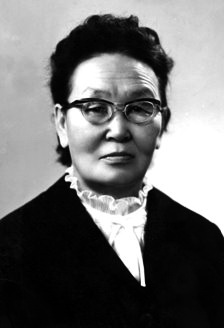
Khertek Amyrbitovna Anchimaa-Toka was a Tuvan and Soviet politician who was the Chairwoman of Little Khural of the Tuvan People's Republic from 1940 to 1944, and was the first non-royal female head of state. She was the wife of Salchak Toka, who was the republic's supreme leader from 1932 to 1973.
Valentina Suzukei is one of the leading ethnomusicologists in the Tyva Republic (Tuva), Russia.
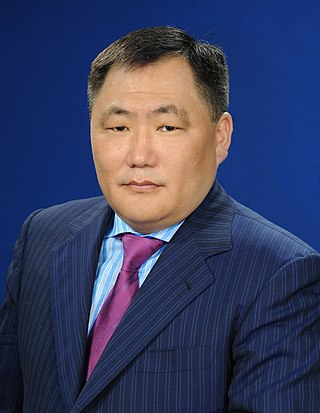
Sholban Valeryevich Kara-ool is a Russian politician of Tuvan ethnic origins. He was the Head of the Republic of Tuva, a Russian republic.

The territory currently known as Tuva has been occupied by various groups throughout its history. Sources are rare and unclear for most of Tuva's early history. Archeological evidence indicates a Scythian presence possibly as early as the 9th century BC. Tuva was conquered relatively easily by the succession of empires which swept across the region. It was most likely held by various Turkic khanates until 1207. It was then ruled by various Mongol-led regimes until the 18th century, when it submitted to the Manchu-led Qing dynasty. Slow Russian colonization during the 19th century led to progressive annexation of the region to Russia in the 20th century. The region was then controlled by the Russian Empire and the Soviet Union before finally joining the Russian Federation in 1992. Throughout this whole time, the borders of Tuva have seen very little modification.

Aldyn-ool Takashovich Sevek was a master Tuvan throat singer.
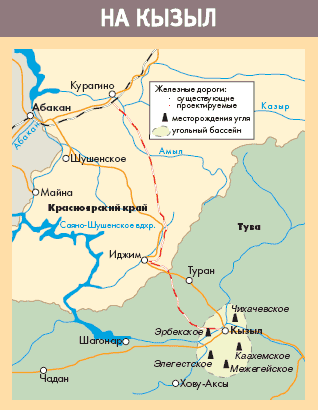
The Kuragino-Kyzyl railway line is an unfinished railway construction project in Tuva, Russia. The railway was estimated to be 411.7 kilometres long and will link Tuva with Krasnoyarsk Krai and railway network of Russia.
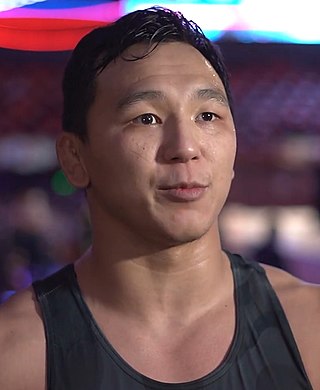
Nachyn Sergeyevich Kuular is a breakdancer and freestyle wrestler from Russia.

Uryankhay Krai was the name of what is today Tuva and was a short-lived protectorate of the Russian Empire that was proclaimed on 17 April 1914, created from the Uryankhay Republic which had recently proclaimed its independence from the Qing dynasty of China in the Mongolian Revolution of 1911. After the February Revolution and abdication of Tsar Nicholas II, Uryankhay Krai recognized the new Russian Republic and reaffirmed its status as a Russian protectorate in 1917.

The Tuvan People’s Republic entered World War II on the side of the Allied Powers, shortly after the invasion of the Soviet Union by Nazi Germany, breaking the non-aggression pact between the Soviet Union and Third Reich.
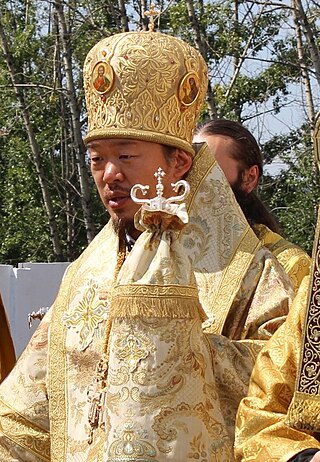
Archbishop Theophanes is a bishop of the Russian Orthodox Church; he is the Archbishop of the Russian Orthodox diocese of Korea of the Patriarchal Exarchate in South-East Asia.

Jampel Lodoy, also spelled with variations of Dzhampel Lodoi or Jambal Lodoi, was a Russian Tuvan Buddhist lama who served as the Kamby Lama of Tuva for two tenures. The Kamby Lama, or Supreme Lama, is the highest Buddhist religious authority in Tuva. Jampel Lodoy was first elected Kamby Lama from 2005 to 2010. During the 2010s, Jampel Lodoy became the abbot of Ustuu-Khuree, one of the largest Buddhist monasteries and temples in Tuva, which had been destroyed in 1937, but reopened in 2012.

The Tuvan People's Revolutionary Army (TNRA) (Russian: Тувинская народно-революционная армия; Tuvan: Тываның Араттың Революстуг Шерии) was the military wing of the Tuvan People's Revolutionary Party which constituted the armed forces of the Tuvan People's Republic.
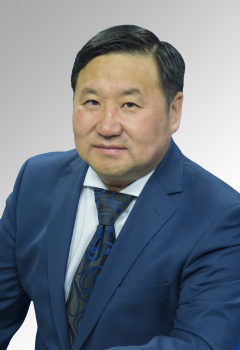
Vladislav Tovarishchtayovich Khovalyg is a Russian politician who is currently the 3rd Head of the Republic of Tuva since 7 April 2021. He is a member of United Russia, the largest and ruling party of Russia.

Kuzhuget Sereyevich Shoigu, born Shoigu Sereyevich Kuzhuget was a Soviet Tuvan politician, journalist, and writer who served as a secretary of the Tuvan Regional Committee of the Communist Party of the Soviet Union, first Deputy Chairman of the Council of Ministers of the Tuvan Autonomous Soviet Socialist Republic, and a deputy of the Supreme Soviet of the Tuvan ASSR. He was also the father of Sergei Shoigu and Larisa Shoigu.


















